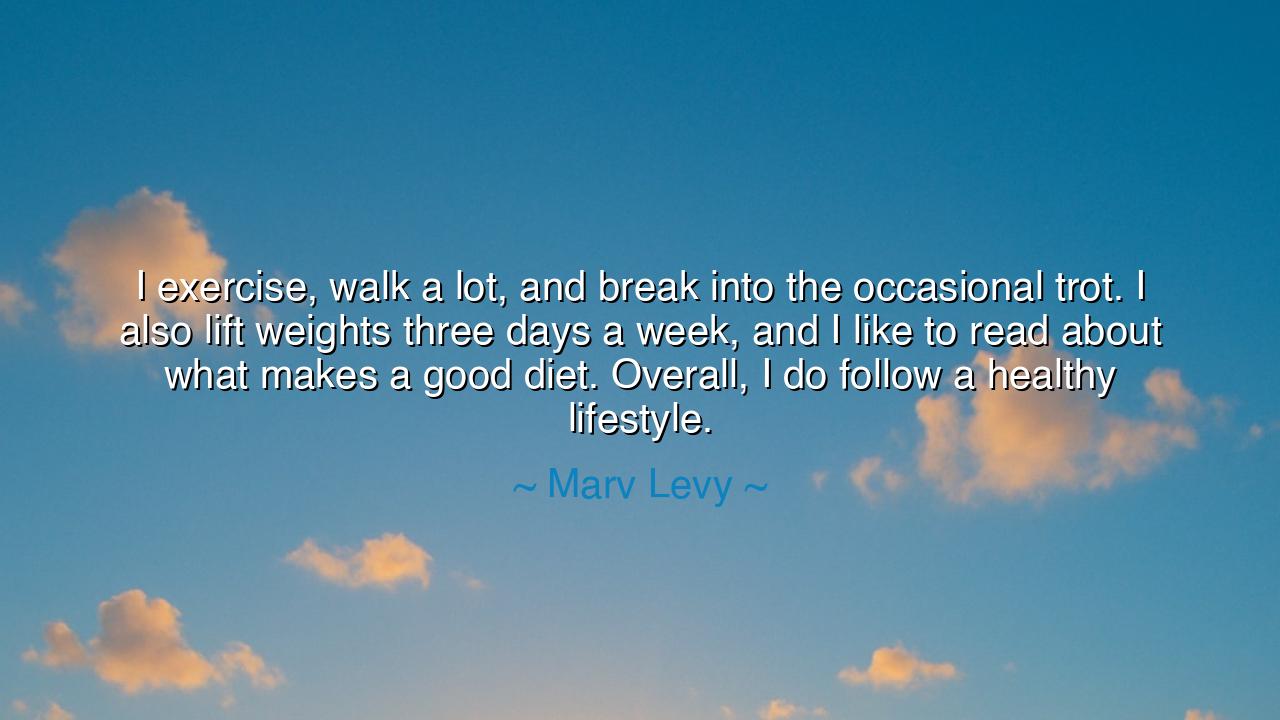
I exercise, walk a lot, and break into the occasional trot. I
I exercise, walk a lot, and break into the occasional trot. I also lift weights three days a week, and I like to read about what makes a good diet. Overall, I do follow a healthy lifestyle.






Marv Levy’s words — “I exercise, walk a lot, and break into the occasional trot. I also lift weights three days a week, and I like to read about what makes a good diet. Overall, I do follow a healthy lifestyle.” — are simple on the surface, yet beneath them flows a river of ancient wisdom. They speak of discipline, of balance, and of the eternal harmony between mind and body. In his statement, Levy reveals not merely a routine of the flesh but a philosophy of the spirit — that health is not an end in itself but a pathway to vitality, to purpose, to endurance against the storms of life.
In the days of old, the ancients revered such balance. The Greeks called it sophrosyne — the virtue of temperance, the wisdom of moderation. They saw the human form as a temple for the divine spark within, believing that strength of body was the twin brother of strength of mind. Marv Levy, in his humble description of walking, lifting, and learning, echoes this same sacred understanding. For in tending to the body, one honors the gift of life itself; in nurturing knowledge, one fortifies the soul. To neglect either is to live half a life.
Consider the tale of Milo of Croton, the legendary Greek wrestler. Each day, he carried a young calf upon his shoulders, and as the calf grew into a bull, so too did Milo’s strength grow with it. This was not mere exercise — it was the art of consistency, the daily act of renewal. Like Levy’s routine, it was steady, deliberate, faithful. The body obeys the law of patience: what is nurtured with care becomes enduring; what is left untended decays. Thus, the lesson is timeless — greatness is not born in bursts of effort but in ritual perseverance.
Yet Levy’s quote also speaks to another kind of strength — that of the mindful spirit. He reads about diet, seeking to understand rather than merely consume. This is a quiet act of reverence — to learn, to question, to walk hand in hand with wisdom rather than drift through habit. It reminds us that true health is not a blind chase after perfection but a conscious harmony between knowledge and action. The ancients would have called this logos, the divine reason that orders the universe. To live healthily is to live with awareness, to be present in one’s choices, to treat each meal, each breath, as sacred.
Even the greatest warriors knew this truth. When Alexander the Great marched across the world, he carried with him not only weapons but philosophers and healers. For he knew that an army’s strength is sustained not merely by courage, but by discipline and vitality. Without rest, food, and wisdom, valor fades. So too in the quiet battles of modern life — our strength must be replenished through motion, reflection, and balance. Marv Levy, a leader of men on the fields of sport, understood that the principles of victory are the same in every age: body, mind, and heart must stand united.
The emotional core of Levy’s declaration is one of respect — respect for the vessel we inhabit, for the life we are given. He does not boast, nor seek glory; he simply honors the rhythm of health as one honors a sacred duty. This humility is the essence of wisdom: to serve life by caring for the self. It is a form of gratitude in motion, a silent hymn sung through the body’s endurance and the mind’s curiosity.
Let this, then, be the lesson to all who hear his words: strength is not in the spectacle of muscles or the pursuit of vanity, but in the quiet, steadfast care of one’s being. Each walk taken, each page read, each choice made with mindfulness — these are the bricks that build a lasting spirit. Like the ancient philosophers, like the disciplined warriors, we must remember that health is not a season but a way of being.
So rise each day, child of the modern age, and walk as Levy walked — not with haste, but with purpose. Lift the burdens that life places upon your shoulders, and let them make you stronger. Feed your body with wisdom as you do with food. For when body and mind are aligned, you do not merely live — you thrive. And in that thriving, you honor the timeless truth: that to care for oneself is to participate in the eternal dance of creation.






AAdministratorAdministrator
Welcome, honored guests. Please leave a comment, we will respond soon